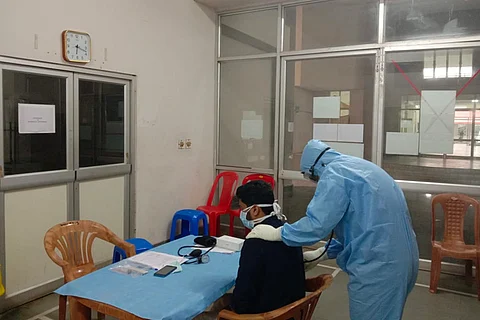

There are nearly six lakh cases of COVID-19 and still counting across the world today. There is till date no vaccine to prevent the disease or medicine to cure it.
So, how exactly are COVID-19 patients being treated?
The Union Health Ministry says, “There is no specific antiviral treatment available for 2019-novel coronavirus infection. People infected with 2019-novel coronavirus should receive supportive care to help relieve symptoms.”
While the general symptoms of COVID-19 include fever, cough and difficulty in breathing, these may appear between two to 14 days after being exposed to SARS-CoV-2, the virus that causes COVID-19. The severity of the illness can range from mild to severe and can even cause death.
The World Health Organisation (WHO) defines mild symptoms as “uncomplicated upper respiratory tract viral infection”. The symptoms include fever, fatigue, cough (with or without sputum production), anorexia, malaise, muscle pain, sore throat, dyspnea, nasal congestion, or headache. COVID-19 patients may also present with diarrhoea, nausea, and vomiting, it states.
What to do if your symptoms are mild
The WHO recommends home care/ self-isolation for persons who present with mild symptoms and without any underlying chronic conditions such as lung or heart disease, renal failure, or immunocompromising conditions that place the patient at increased risk of developing complications. This advisory is to ensure that the healthcare system isn’t burdened.
Most people who are infected by the novel coronavirus present with mild symptoms - 80% by some initial estimates. Plenty of rest and staying hydrated is the general medical advice given to those with mild symptoms. In addition, paracetamol is prescribed to relieve a fever and other aches.
The WHO also advises against taking antibiotics to treat COVID-19. “Antibiotics do not work against viruses, they only work on bacterial infections. COVID-19 is caused by a virus, so antibiotics do not work. Antibiotics should not be used as a means of prevention or treatment of COVID-19,” states the organisation.
Those with mild symptoms can contact the helpline number of their respective state for advice on testing.
What to do if your symptoms are severe
Patients who present with severe symptoms which include high fever and breathing difficulties and have underlying health conditions such as lung or heart disease, renal failure, or immunocompromising conditions should contact their nearest health centre.
Recovery
The WHO says that most people who have mild to moderate symptoms of COVID-19 recover without any special treatment.
As far as India is concerned, if a patient tests positive for the coronavirus and is receiving treatment at an isolation ward of a hospital, the person will be discharged only after a minimum of 15 days. According to the National Centre for Disease Control (NCDC), “The case shall be discharged only after evidence of chest radiographic clearance and viral clearance in respiratory samples after two specimens test negative for 2019-nCoV within a period of 24 hours.”
Furthermore, NCDC states that the first sample for discharge can be taken 14 days after the collection of the first sample which tested positive for SARS-CoV-2. The second sample is taken after at least 24 hours have elapsed since the first negative sample.
Following discharge, many state governments have also been advising an additional home quarantine of 14 days.